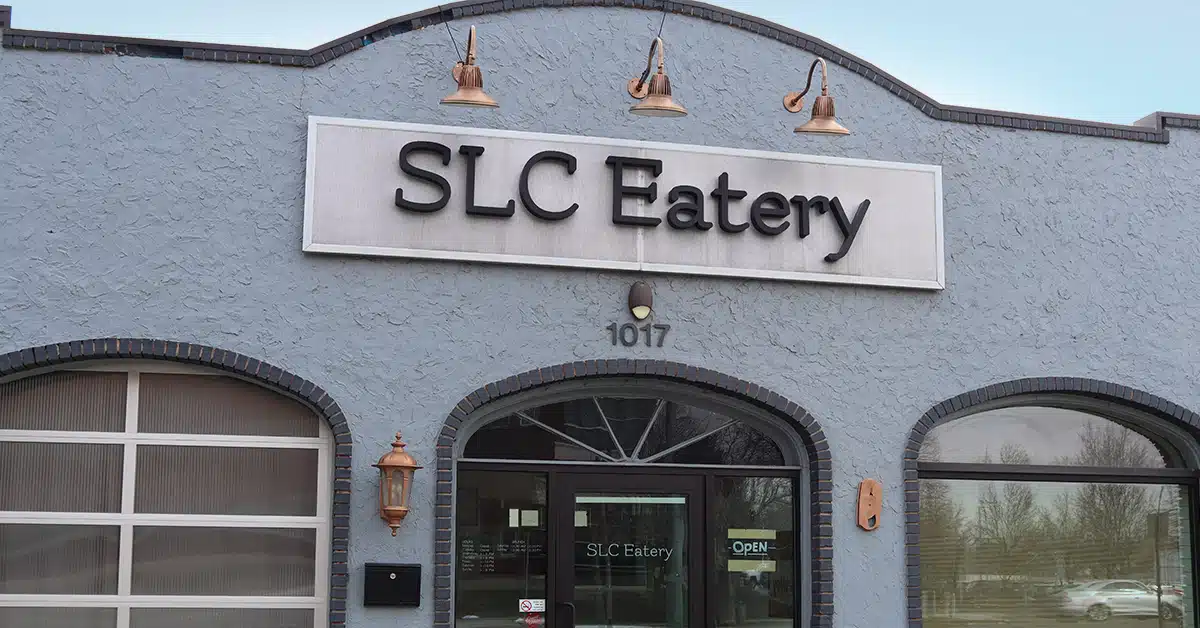If you could go back to young Logen, what would you tell him?
“Oh, man. We would need a long, long talk.”
I had the pleasure of sitting down with James Beard regional finalist Logen Crew this week, Executive Chef at SLCEatery, one of twelve recent winners of Salt Lake Magazine’s Best Restaurant in Utah awards.*
Years ago, Logen was a self-described “angry” kid, fighting, partying, and messing around until football season, when he’d shape up a bit. He made his way into his high school’s at-risk program, PAWS (Positive Alternatives Within School), and stumbled into the culinary CTE program.

“I thought it would be an easy A,” Crew admits. He had family in the restaurant world, with an uncle who owned a BBQ restaurant and a grandfather who was a cook for the Army.
But this was no typical high school culinary program.
This special-ed-turned-CTE teacher, Barb Scrafford, took the work-based learning portion of her program to the next level.
This program’s leader made the most of their full-service kitchen and created an internal restaurant called “The View.” She set up her students so they would serve two lunch shifts one day a week. She arranged for the kids to develop a three-course menu and full restaurant service every time there was a school play–which included everything from hosts and line workers to a head chef. Crew, with his talented cooking abilities, admits he was usually chosen for the head chef role.
“That definitely instilled a lot of confidence in me, and then also just to get a glimpse of how restaurants work.” He continued, “Barb put in so many extra hours with us. After school, meeting on Wednesdays just so she could watch us cook. She is an amazing woman for doing that.”
But Scrafford didn’t stop there. She worked with her connections throughout the restaurant community to get her students into kitchens with local chefs who would describe what the work looked like, what the hours entailed, and how the business ran. The chefs let the students into their kitchens to get access to their teams and ask them questions.
Next, she took advantage of the Utah Restaurant Association-sponsored competition “Pro Start”–a national high school competition in which 3-4 student chefs create a three-course menu without electricity. Crew recalls, “There are certain specific things you have to do: knife cuts, breaking down a chicken”—the same types of things most certification programs include in their standards.
Crew had a mentor chef from the community who volunteered his time, Peter Hodgson, who spent time with the students to help them get creative and who judged at the state level. Crew’s team of four (he smiled as he mentioned each name) took state and went to Florida for the national competition, winning third in the nation.
From there, Crew was offered his first job thanks to the connections from that competition.
Since then, he’s paid it forward. He’s mentored different teams and accompanied two groups to nationals. He also hosts a lunch for his high school’s culinary program at his restaurant. “We show them different foods they aren’t necessarily eating at home–at least I wasn’t at their age. I’m trying to open their eyes, trying to get them to spark something in the menus they’re creating.”
Though Crew says he sometimes wishes he’d walked through more of the doors open to him, he doesn’t express regret in the path he’s taken.
“I went to [college] for six months, and I didn’t even make it into the kitchen because I had to do all the English and Math and stuff, and that wasn’t my strong suit ever. Thank god for [my PAWs teacher] who got me through that part of high school, but I was moving up so fast in the restaurant, I just made a choice to not finish school.”
Crew admits, “That piece of paper gets you in a lot of doors,” so he does wish he’d both worked and gotten a degree, but in all his mentorship conversations from the chefs working with that work-based learning program in his high school, no one told him he had to go to culinary school.
“They said, ‘come get experience before.’… Not one of them that I can remember told me to go to culinary school. They didn’t say, ‘Don’t go.’ They said the same thing that I say: ‘get experience before you go.’”
He tells students now the same thing:
“I welcome any of them to come hang out in the restaurant and watch, to work if they’re of age. I think that’s the most important thing, even for a month or a couple days. A lot of people who go to culinary school get out of school thinking that they’re going to walk into a restaurant and be executive chef, and then they end up peeling potatoes, making minimum wage for three months, and it’s pretty crushing. So, as much experience as they can get and preparation they can have before making that decision to go to school—I always tell them to do that.”
But, according to Crew, “Culinary school is not a requirement at all.”
On the flip side, he says, “Having these programs and certifications is really going to help, you know, gear them before they make the mistake of spending all that money and then hating being a chef.”
I asked if a personalized pathway would have been helpful for him, even though he essentially fell into one.
“There were plenty of times where I didn’t know what I was doing, if I was on the right path–be it the restaurant I was working at or if I wanted to be a chef still because sometimes it gets really hard. Definitely any information I would have had for myself or about the career I was about to take beforehand would have helped out a lot. An aptitude [assessment] would have been great. I would have probably made some different choices of where I was working and how long I was working there.”
“If it’s an interest, make it a hobby. But if it’s something you really want to do, the Aptitude test would be amazing. You don’t want to waste too much of your time.”
And sitting there, in this beautiful restaurant space, it was clear he hadn’t wasted his time. I asked him if he was happy.
“I’m very happy now, yes–especially in this restaurant with my best friend and someone I’ve worked with for twenty years.” He explained how his current team has been together for the last four years since SLCEatery opened—and he’s even worked with his now-girlfriend for several years.

I finally returned to the fighting question, to his time in the at-risk classroom. I asked, “What if you hadn’t been in that culinary CTE program?”
There was no hesitation as he responded:
“I wouldn’t have graduated high school. There’s no way. I have no idea what I would be doing,… but if it wasn’t for that program and [those teachers], I would not be sitting here today. No way.”

